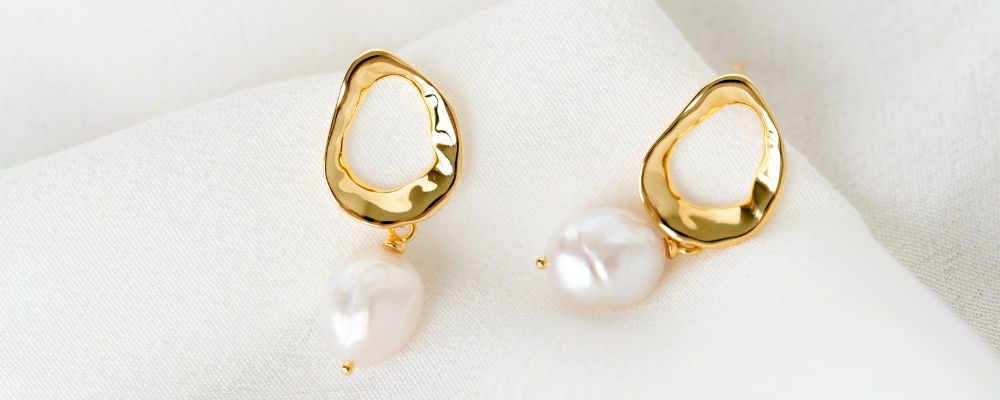How to Tell if Pearls Are Real: A Complete Guide on Real Pearls vs Fake Pearls | Linjer Jewelry
What Are Real Pearls?
Real pearls are pearls that are formed in mollusks, highly valued and prized for their natural beauty and rarity. Unlike fake pearls, real pearls often have small irregularities that give each pearl a unique quality.
Real pearls, whether naturally occurring or cultured through human intervention, are formed when an irritant, such as a grain of sand, enters a mollusk's shell and triggers a defense mechanism. The mollusk secretes nacre, a smooth and iridescent substance, to coat the irritant and protect itself. Over time, as the layers of nacre continue to accumulate around, a pearl begins to form!
Real pearls can be divided into four main types—freshwater pearls, Akoya pearls, Tahitian pearls, and South Sea pearls. Each with its own distinct characteristics in terms of size, shape, color, and luster.
Shop Our Pearl Jewelry
Pearl Drop Earrings - Mathilde |
Pearl Huggie Earrings - Kirsten |
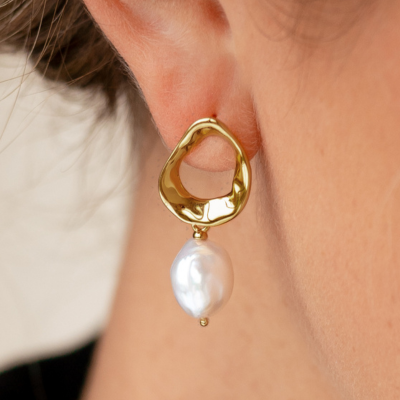 See Product |
 See Product |
Baroque Pearl Necklace |
Hoop Earrings with Pearl - Rebecca |
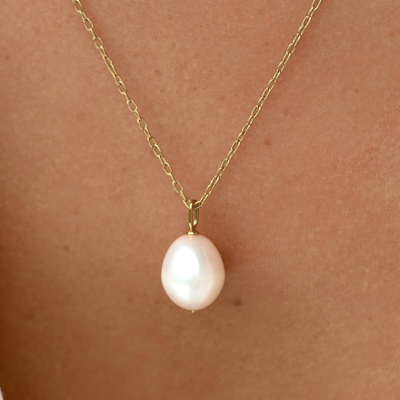 See Product |
 See Product |
What Are Fake Pearls?
Fake pearls, also called imitation pearls, are man-made alternatives to real pearls. They are made from materials such as glass, plastic, or ceramic, and coated with a substance that gives them a pearl-like appearance. This coating can be made from a variety of materials, including fish scales, mother of pearl, or synthetic substances like titanium dioxide.
Unlike real pearls, fake pearls are usually completely uniform in shape, size, and color, with no variations or blemishes. Types of fake pearls include glass, plastic, and shell pearls. As the name suggests, glass pearls are made from glass beads and plastic pearls are made from acrylic or other synthetic materials. Shell pearls are made from the inner lining of oyster shells (aka Mother of pearl) that have been ground into a fine powder and reconstructed into a pearl shape.
Shop Our Pearl Jewelry
Keshi Pearl Necklace - Marit |
Pearl Stud Earrings - Lea |
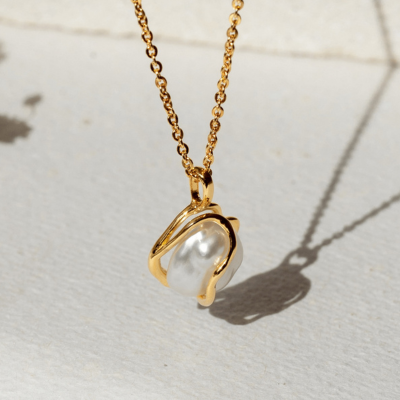 See Product |
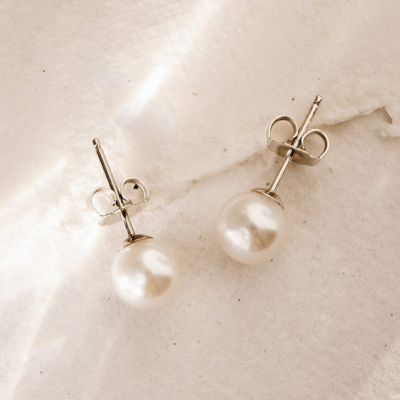 See Product |
Pearl Ring - Lea |
Pearl Bracelet - Eli |
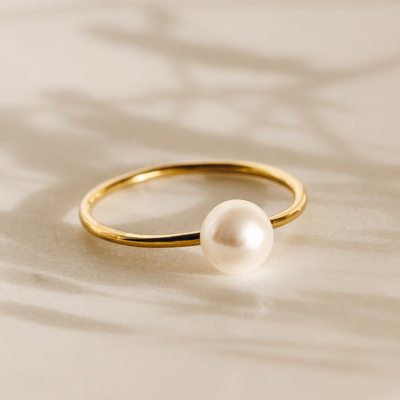 See Product |
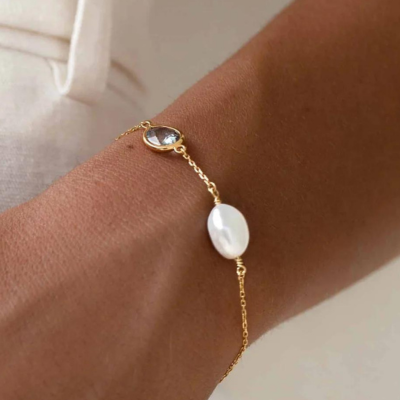 See Product |
How to Tell Real Pearls from Fake
If you're in the market for pearls, it's important to know how to differentiate between real pearls and fake pearls. Here are a few of our best tips:
Visual Inspection
Real pearls have a unique luster and surface quality that cannot be imitated by fake pearls. Their soft, glowing and iridescent luster creates a shimmering, light-reflecting surface that fake pearls lack, often having a more matte, uniform surface.
Real pearls are like snowflakes, no two are exactly the same! They tend to have slight variations in color, shape, and size which make them even more special. And, unlike fake pearls, natural pearls may have tiny imperfections that contribute to their unique beauty and charm.
Weight and Texture
Real pearls are generally heavier than fake pearls, due to their density and solid nacre composition. They also have a distinct texture that is slightly gritty or sandy to the touch, unlike the smooth and uniform texture of fake pearls. By holding the pearls and feeling their weight and texture, you can get a sense of their authenticity.
Rub Test
Another common method for testing pearls is the rub test, which involves rubbing the pearls against your teeth or against each other. Real pearls have a slightly rough or gritty surface, which can be felt when rubbed against the teeth while fake pearls will feel smooth and glassy. However this test should be done with caution, as real pearls are delicate gemstones that can be scratched or damaged!
X-ray or Ultrasound Testing
For a more precise and accurate method of testing pearls, you can use X-ray or ultrasound techniques to examine the internal structure of the pearls. This can reveal whether the pearls are made of solid nacre or another type of material. This method is usually reserved for high-value pearls and requires specialized equipment.
Professional Appraisal
If you are unsure about the authenticity of your pearls, you should seek out a professional appraisal from a trusted jeweler or gemologist. Jewelers can examine the pearls using a range of specialized tools and techniques, and provide you with a detailed assessment of their value and authenticity.
Investing in high-quality, authentic pearls is a lasting decision. By using these reliable methods to distinguish real pearls from fake, you can shop confidently and get the best value for your investment. Though some fake pearls can be deceivingly similar to the real deal, careful inspection can go a long way when selecting your perfect pearls.
Are Real Pearls Worth Money?
Yes, real pearls are definitely worth the money for their unique quality, rarity and durability. They come in a variety of types, each with its own distinct characteristics and price range, making them a smart choice for those looking to build a jewelry collection with long-term value.
Pearls have been a popular jewelry choice for centuries and have been boasted by royalty, celebrities, and fashion icons alike. From classic pearl necklaces to modern pearl earrings, they can be worn in a variety of styles to complement any occasion. This timeless appeal makes pearls a wise investment, as they can be worn and enjoyed for years to come without ever going out of style.
Should I Buy Fake Real or Real Pearls?
When it comes to purchasing pearls, we highly recommend buying real pearls over fake pearls. While fake pearls may be a more affordable alternative, they lack the luster and unique beauty of real pearls, and do not hold value over time.
Real pearls are highly valued for their natural allure, rarity, and lasting quality. It's important to note that the price can vary widely depending on factors such as the type of pearl, size, shape, and quality. However, shopping at independent jewelry brands (such as Linjer!) can be a great way to find affordable real pearls without compromising on quality. These brands often have lower markups than luxury jewelry retailers with a wider range of price points.
Whether you prefer bold pearl necklaces, classic studs, flirty bracelets, or dainty rings, you’ll discover your ideal pearl jewelry aesthetic amongst Linjer’s Pearl Collection!



